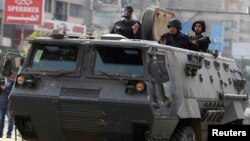CAIRO —
Egypt's foreign ministry summoned Qatar's ambassador on Saturday to complain about interference in its internal affairs after Doha criticized Cairo's crackdown on the Islamist Muslim Brotherhood.
The formerly close Qatari-Egyptian relationship has soured since the Egyptian army ousted democratically-elected President Mohamed Morsi, who had been firmly supported by Doha, last July following mass protests against his one-year rule.
Cairo then launched a wide crackdown against Morsi's Muslim Brotherhood group and labeled it a terrorist group last week.
A conservative estimate puts the death toll since Morsi's fall at well over 1,500 people, mainly Brotherhood supporters. About 400 police and soldiers have been killed in bombings and shootings.
Qatar said on Saturday that the decision to name the Brotherhood a terrorist organization was “a prelude to a shoot-to-kill policy” against demonstrators who have been staging frequent protests to call for Morsi's reinstatement.
“Egypt reiterates that it will not allow any external party to interfere in its internal affairs under any name or justification,” Egypt's Foreign Ministry spokesman Badr Abdelatty said in a statement.
Any country that tried to interfere would have “the responsibility for the consequences,” he added of the message given to Qatar's ambassador to Cairo, Saif Moqadam Al-Boenain after the envoy was called in on Saturday.
Egypt accuses Qatar and its Doha-based Al Jazeera television channel of backing the Muslim Brotherhood. Thousands of the Brotherhood's members have been arrested.
Earlier, a Qatari foreign ministry statement said: “The decision to designate popular political movements as terrorist organizations, and labeling peaceful demonstrations as terrorism, did not succeed in stopping the peaceful protests.
“It was only a prelude to a shoot-to-kill policy on demonstrators,” the statement published by state news agency QNA said. It said that “inclusive dialog” between all sides was the only solution to Egypt's crisis.
On Friday, 17 people were shot dead as supporters of the Brotherhood clashed with police across Egypt, defying a widening state crackdown on the movement that ruled the country until six months ago.
Islamists opposed to the army's overthrow of Morsi have been holding daily demonstrations for months.
Last week, Egypt's general prosecutor detained several journalists for 15 days for broadcasting graphics on Al Jazeera, alleging that they damaged Egypt's reputation.
In an interview with Egypt's newspaper Al-Masry Al-Youm in November, Foreign Minister Nabil Fahmi said Al Jazeera was one of the reasons for worsening ties between the two states.
Egypt expelled the Turkish ambassador in November after it accused Ankara of backing organizations bent on undermining the country - an apparent reference to the Brotherhood.
The formerly close Qatari-Egyptian relationship has soured since the Egyptian army ousted democratically-elected President Mohamed Morsi, who had been firmly supported by Doha, last July following mass protests against his one-year rule.
Cairo then launched a wide crackdown against Morsi's Muslim Brotherhood group and labeled it a terrorist group last week.
A conservative estimate puts the death toll since Morsi's fall at well over 1,500 people, mainly Brotherhood supporters. About 400 police and soldiers have been killed in bombings and shootings.
Qatar said on Saturday that the decision to name the Brotherhood a terrorist organization was “a prelude to a shoot-to-kill policy” against demonstrators who have been staging frequent protests to call for Morsi's reinstatement.
“Egypt reiterates that it will not allow any external party to interfere in its internal affairs under any name or justification,” Egypt's Foreign Ministry spokesman Badr Abdelatty said in a statement.
Any country that tried to interfere would have “the responsibility for the consequences,” he added of the message given to Qatar's ambassador to Cairo, Saif Moqadam Al-Boenain after the envoy was called in on Saturday.
Egypt accuses Qatar and its Doha-based Al Jazeera television channel of backing the Muslim Brotherhood. Thousands of the Brotherhood's members have been arrested.
Earlier, a Qatari foreign ministry statement said: “The decision to designate popular political movements as terrorist organizations, and labeling peaceful demonstrations as terrorism, did not succeed in stopping the peaceful protests.
“It was only a prelude to a shoot-to-kill policy on demonstrators,” the statement published by state news agency QNA said. It said that “inclusive dialog” between all sides was the only solution to Egypt's crisis.
On Friday, 17 people were shot dead as supporters of the Brotherhood clashed with police across Egypt, defying a widening state crackdown on the movement that ruled the country until six months ago.
Islamists opposed to the army's overthrow of Morsi have been holding daily demonstrations for months.
Last week, Egypt's general prosecutor detained several journalists for 15 days for broadcasting graphics on Al Jazeera, alleging that they damaged Egypt's reputation.
In an interview with Egypt's newspaper Al-Masry Al-Youm in November, Foreign Minister Nabil Fahmi said Al Jazeera was one of the reasons for worsening ties between the two states.
Egypt expelled the Turkish ambassador in November after it accused Ankara of backing organizations bent on undermining the country - an apparent reference to the Brotherhood.





